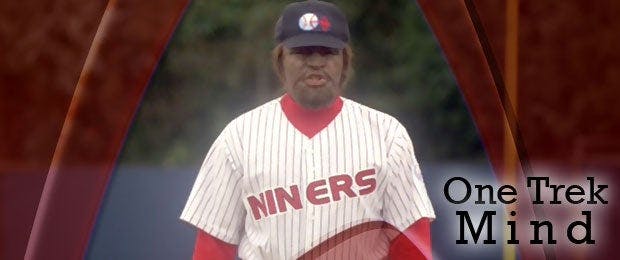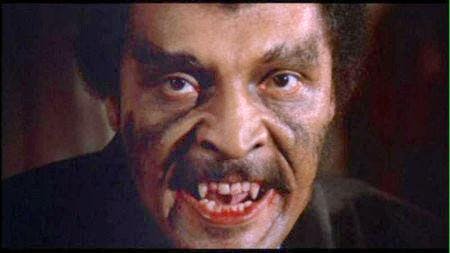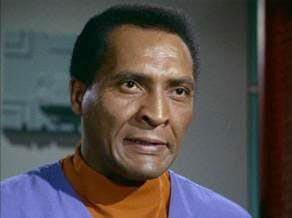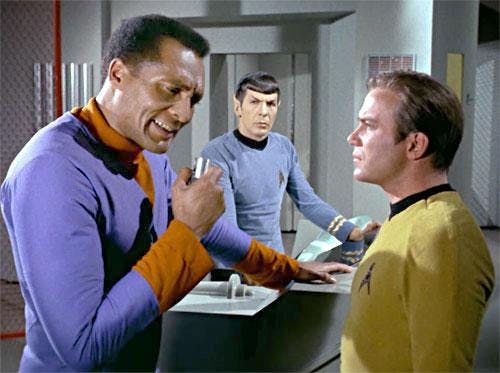Published Oct 21, 2013
STARLOGGING WITH DAVID MCDONNELL: Horror of Blacula!
STARLOGGING WITH DAVID MCDONNELL: Horror of Blacula!


This was, of course, the great Shakespearean actor William Marshall (who died in 2003). He was a man of supreme gravitas best known to pop culture at large for acting in a pair of low-budget blaxploitation flicks, 1972's Blacula and 1973's Scream, Blacula, Scream! (And he's excellent in those two not-so-good pictures). Decades later, he would reign over Pee-wee's Playhouse as the King of Cartoons. But this was October 1974, Halloween fast approaching.
Marshall had been on stage at the Old Main Hall at Bethany College (where I was a very young, extremely naive freshman) giving a performance of Shakespeare selections. He was only the first in a series of celebrity guest speakers who journeyed to that "small college of distinction located in the rolling hills of West Virginia" (as Bethany's PR material proclaimed) during my four years there.
Due to its student body size (just 1,200+) and relative isolation, Bethany offered much closer encounters with famous folks than you might find at larger institutions (I sure didn't experience that later while at grad school at Syracuse University, with its 15,000+ students). The nearest big city travel connection, the Pittsburgh (Pennsylvania) Airport, was an hour+ away, so campus guests tended to arrive early for evening programs and stay over. This allowed lotsa "quality time," before or after, for legendary cartoon voice maestro Mel Blanc to drink with undergrads, newscaster Roger Mudd to dine with us and Roots author Alex Haley (years before the TV mini-series that introduced The Next Generation's LeVar Burton) to "party Carty" with both students and faculty at Communications Department head Jim Carty's home. Fun. Good times.
Cue three graphs of relevant backstory: New to the college radio station, I had attended a recruitment meeting in early September and joined WVBC FM's Promotions Staff. We newcomers were assigned to write sample promo copy for different radio shows and turn it in the next week. I did. Some of the other newbies didn't. And fate took a (blue) hand. You see, WVBC Student Director Bill Wolfson (a senior) had unexpectedly landed a real TV station internship way-off-campus and had to resign as anchor of the live, student-staffed, one-hour weeknightly broadcast Insight News. Promotions Director Jeff ("Blue") Raithel (a junior) would replace Wolfson---and Raithel, citing my promo copy, nominated me (a lowly freshman, I remind you) to succeed him as Promotions Director. Suddenly, I got the job I would hold at WVBC for the rest of my college days (and which prompted pursuit of an advertising career, eventually rerouted into my hobby, pop culture journalism). Changed my life! Thanks, "Blue."
A week or two later, the overburdened Raithel called me into the WVBC newsroom and asked me, as a favor, to write an editorial commentary for Insight News (assigned topic: the "Kent State Massacre"). I did, turned it in, asked, "Who's gonna deliver it?" Raithel looked at me, "You are. Live." I gulped, but that began my other accidental, longtime gig as WVBC's teen Andy Rooney, rushing down to the station evenings at six, pounding out a commentary (newsy, anecdotal, funny, sad) on a typewriter and just an hour or so later, reading it live on-air (or pre-taped when necessary). Doing all those commentaries was fabulous training for writing magazine editorials and Starlogging essays (like this one). Changed my life again!
And then, a third! A few weeks later, during the intense Insight News prep time, I asked the ever-busy Raithel if we had any of our reporters interviewing William Marshall, performing on campus that very evening. "No," Raithel said, "you do it." So, I did.
Back to Blacula! Marshall was incredibly gracious---and quite tall---as I approached after his program ended and requested an interview. Lesson #1 for later Starlog use learned: Never be afraid to ask anyone for an interview. If it's a no, so what? "Certainly," Marshall said in his deep voice, cultured, perfect for radio.

And let me confess here: Because I had to be on-air at WVBC doing a live commentary at the same time, I had missed most of Marshall's stage presentation. Lesson #3 for my later magazine work: If possible, see the subject's latest project so you'll know what you're talking about. Fortunately, Marshall didn't seem to notice my ignorance---or, more likely, generously didn't comment on it. He was just terrific and---did I mention?---tall.
Then, I asked him about one past production (unlisted in this entry) and, to my horror, he explained it hadn't been a great experience due to a fellow actor (previously a favorite of mine) and instances of "Hollywood racism." Naive me. I was startled. And, thus, Marshall (also a respected acting teacher) taught me Lesson #4: When you ask questions in interviews, you're sometimes going to learn things you'll regret knowing. That's a sad fact repeated again and again at Starlog (and possibly even in these very essays).
I'm sorry that I can't provide you with his actual words. Almost 40 years later, I do remember one line. Marshall was talking about his trials and travails as a young man, uncertain of where his life and career might go. "And then," he said, "I stepped out on stage as God...in The Green Pastures." Yes, he gave the line that specific dramatic pause in noting his role in a 1951 Broadway revival of Marc Connelly's Pulitzer Prize-winning fable (which, set in the Southern U.S., retells the Old Testament from a young African-American viewpoint). Marshall as God? Yes, I could envision that.
Fumbling with my oversize tape recorder, nervous about my notes, I was undoubtedly not the picture of an aspiring professional that night. But, you see, other than students and teachers for my high school newspaper, this was my very first real interview---with anybody, much less the kind of actor whom I would soon enough spend decades crafting magazine stories about. But he couldn't have been nicer. Thank you, William Marshall!
How I would love to share his words with you! After our talk, I returned to my freshman dorm room and (I believe) transcribed the interview. In 1975, that Q&A was tentatively targeted for a fanzine that a fraternity brother and I hoped to co-edit and publish, but, alas, The Mirror of Galadriel never saw print. That Marshall transcript is long misplaced, might still lurk in my dusty file cabinet of fandom correspondence, unfinished stories and old radio show scripts, but, horrors, I can't find it. And the interview was meant for radio anyway.
Speaking of radio, I duly reported to WVBC Station Manager (and faculty member) Jim Humes the next day. I told him that, despite my inexperience, the chat had gone well. He wanted to listen to it before determining how best (and if) it could be used on air. I gave him the tape cassette and he dropped it in a desk drawer. Lesson #5: Never give up your interview tapes! (And I've kept almost all ever since!) Because, you've guessed it, weeks later, Humes admitted to me that he had lost the Marshall tape---horrors!---and had never even listened to it.
I always felt bad that William Marshall gave so freely of his time and yet nothing came of that interview (except some valuable journalistic experience and practical lessons for me). And 24 years later, I was at last able to make good on this debt and publish an all-new interview with him -- in Starlog. Actually, two. My writers Pat Jankiewicz and Mark Phillips each talked with him separately at different times in 1997-78 and those were combined for a longer, more comprehensive magazine profile.
Star Trek's Dr. Daystrom "was an interesting role. I was the world's smartest man, but I build a computer that immediately runs amok," Marshall told Jankiewicz and Phillips then, noting that he got the part just prior to production. "It felt like I only had minutes to prepare---only two days to work before shooting was scheduled. While I enjoyed it, I had a lot of lines to learn. It was a last-minute job, but I liked the role and the challenge it presented. On Star Trek, I had the least amount of time to work, but I was the character talking all the time!"

Marshall's 1968 voyage on the U.S.S. Enterprise continued to reverberate throughout his lifetime. "I'm stopped every day by people who say I look like that guy who built the computer on Star Trek," he explained in that Jankiewicz-Phillips piece in issue #255. "I didn't know I would still hear about it 30 years later. It's especially pleasurable to be recognized by Trekkers. I can testify that their number is legion, their memories, prodigious and their enthusiasm, great."
That interview was published in the October 1998 Starlog. We called it "The Ultimate Actor."
________________
David McDonnell, "the maitre’d of the science fiction universe," has dished up coverage of pop culture for more than three decades. Beginning his professional career in 1975 with the weekly "Media Report" news column in The Comic Buyers’ Guide, he joined Jim Steranko’s Mediascene Prevue in 1980. After 31 months as Starlog’s Managing Editor (beginning in October 1982), he became that pioneering SF magazine’s longtime Editor (1985-2009). He also served as Editor of its sister publications Comics Scene, Fangoria and Fantasy Worlds. At the same time, he edited numerous licensed movie one-shots (Star Trek and James Bond films, Aliens, Willow, etc.) and three ongoing official magazine series devoted to Trek TV sagas (TheNext Generation, Deep Space Nine, Voyager). He apparently still holds this galaxy’s record for editing more magazine pieces about Star Trek in total than any other individual, human or alien.
Copyright 2013 David McDonnell
